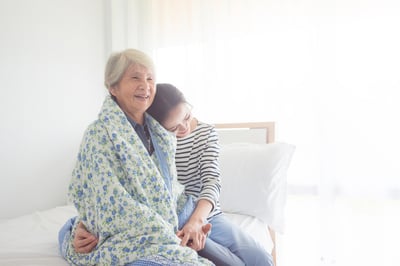 Does it feel like the seniors in your life are always feel cold? There are scientific reasons why caregivers are constantly asked to turn up the thermostat. Let's take a closer look at the issue, along with ways you can keep aging loved ones warm, comfortable, and safe.
Does it feel like the seniors in your life are always feel cold? There are scientific reasons why caregivers are constantly asked to turn up the thermostat. Let's take a closer look at the issue, along with ways you can keep aging loved ones warm, comfortable, and safe.
Why Seniors Feel Cold
Aging adults feel sensitive to cold temperatures for a variety of reasons, from thinning skin to heart issues. These reasons fall under two broad categories: general aging or underlying health conditions.
Aging
According to MedlinePlus, "As you get older, it becomes harder for your body to control its temperature." This can happen for several reasons.
- A decrease in fat and thinning skin make it difficult to conserve heat.
- Aging causes a natural decrease in metabolic rate, which means seniors' bodies might be unable to generate enough heat to maintain a "normal" temperature of 98.6 degrees.
- Slower circulation can make it difficult to retain heat throughout the body. This could be due to aging or medication side effects.
Since seniors experience a combination of these factors, it's no surprise that while a heated room or warm spring day feels temperate — or even hot — to you, it could feel downright chilly to your aging loved one.
Underlying Medical Conditions
Increased susceptibility to the cold is not always age‑related. It can also be caused by other factors, such as the following:
- Hypothyroidism
- Anemia
- Atherosclerosis
- Diabetes
- Cardiovascular disease
- Medication side effects
If you notice a change in your loved one's ability to tolerate cooler temperatures, check in with their physician to determine whether there may be underlying factors at work.
Understanding Seniors' Risk of Hypothermia
Whatever the cause of sensitivity to the cold in older adults, hypothermia is a very real threat for seniors. According to the National Institute on Aging. For an older person, a body temperature of 95°F or lower can cause many health problems, such as a heart attack, kidney problems, liver damage, or worse."
While most people think hypothermia occurs only in frigid conditions, seniors with slower metabolism can experience hypothermia in temperatures in the mid‑70s! This is particularly alarming since, as John Hopkins Medicine reports, half of the elderly people who get hypothermia die before—or just after—they are found.
Tips for Keeping Seniors Warm
If the seniors in your life mention that they are feeling cold, take it seriously. Act quickly. Caregivers play a critical role in hypothermia awareness and prevention. Here are some ways to keep seniors warm and prevent dangerous hypothermia:
- Adjust the thermostat. The leading cause of hypothermia is a poorly heated home. Set thermostats no lower than 65 or 70 degrees.
- Encourage seniors to dress for the weather. Layers are ideal because they can be removed if the aging adult starts to feel overheated. When going outside in cold weather, scarves and hats are critical to keeping cold at bay.
- Use mealtimes to generate heat. Eating large portions can generate heat by amping up the body's digestive process. It's also helpful to offer seniors warm beverages regularly. Encourage hot drinks like coffee or tea. Avoid alcohol, which triggers heat loss.
Remember, while it's normal for seniors to feel a bit cold, chills and sensitivity to slight temperature drops could signify the need for medical attention.
Awareness and vigilance are important. Family members and caregivers should stay alert for signs of hypothermia in seniors and encourage clothing layers and warm drinks whenever an aging adult feels chilled. If you are concerned about how often your aging loved one or patient feels cold, don't hesitate to contact their physician. There are also community resources available to help expand your knowledge and support your role as a caregiver.

